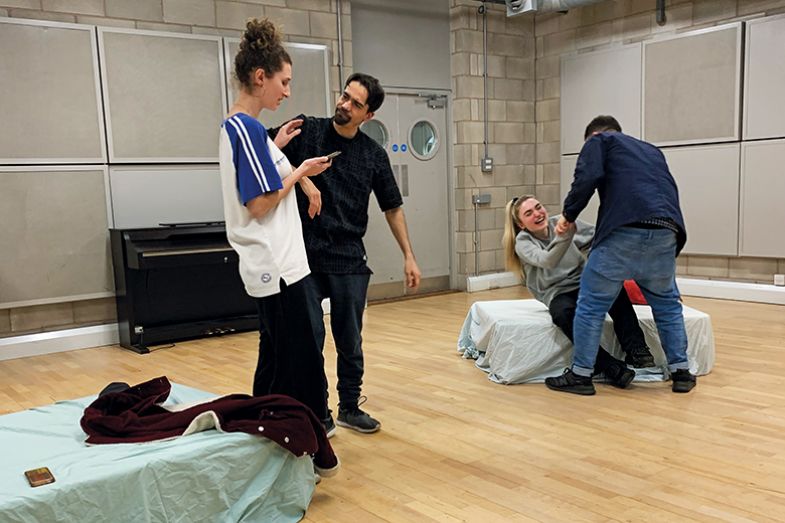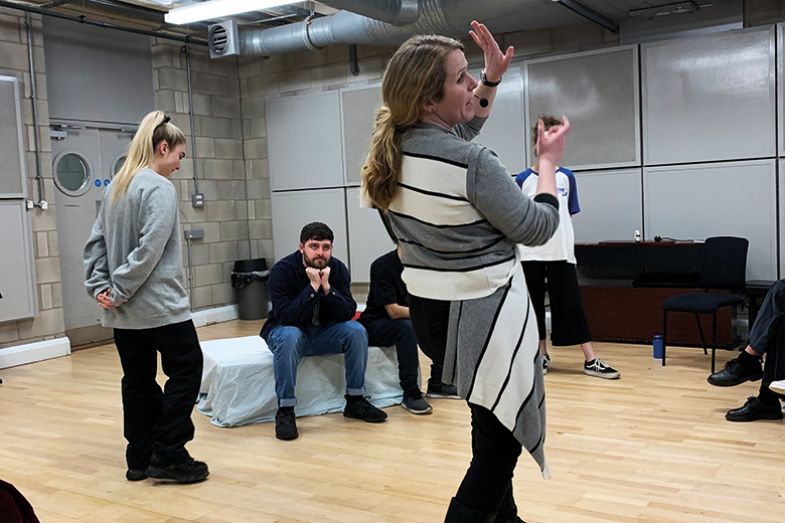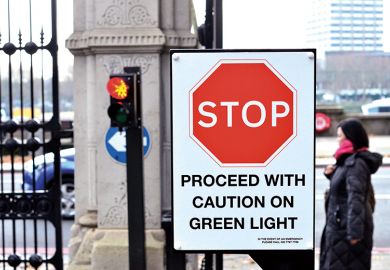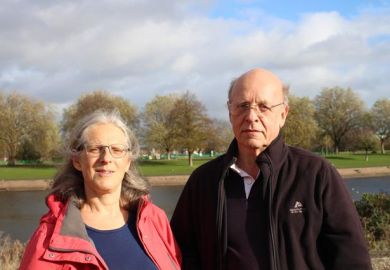At the back of a draughty hall, 20 or so students have gathered on a damp Friday afternoon to take part in one of the University of Manchester’s new consent workshops. Most of the attendees are women, but the organisers say they’ve had a more even gender mix in other sessions.
Meg Fenwick, the facilitator, is giving a lively presentation. An employee of the charity Odd Arts, which uses theatre and creative arts to address challenging issues, she asks lots of questions – and, despite the awkwardness of the topic, begins to get some candid and thoughtful answers.
For example, the audience are directed to stand on one side of the room or another depending on whether they’ve “always gained consent” before having sex. Some assign themselves to the “I don’t know” category in the middle. The group then talks through some of the reasons why the question is difficult to answer. They decide that the issue is to decipher consent in situations where it is given subtly, and when there probably wasn’t an explicit “yes/no” conversation.
One student, a woman, argues that it should be easy to tell what’s going on with a partner. “It isn’t sexy if someone isn’t reciprocating,” she says, and everyone agrees. But another woman says that it is hard to say no to people, since society encourages politeness and “you don’t want to hurt their feelings”.
Fenwick goes on to explain the ways we give consent, or not, in our everyday life. She asks for a volunteer and then strides towards them arms outstretched for a big hug and – somewhat surprised – they tentatively hug her back. Everyone laughs. The group discusses body language and the cues people give if they are not comfortable with physical contact, even when it’s just a hug.
Then four young actors perform a play or piece of “forum theatre” portraying students in a friendship group dealing with the consequences of the rape of one of the women by one of the men on a night out. Many of the issues raised – everybody was very drunk and the pair had been in a previous, consensual sexual relationship – are typical of cases of sexual assault and rape at university. Eventually, the victim drops out after receiving little understanding from her friends and getting into trouble for missing lectures.
Discussing it afterwards, the real students in the audience talk about the missed signs that something wasn’t right and the attitudes (disbelief, lack of sympathy) that led the victim to leave the university.
But they also talk about what they might have done differently. Some say it would have been better if at least one of the group had noticed how drunk their friend had become.
“It’s not an easy or fun job, is it,” says Fenwick sympathetically, “trying to take care of an inebriated friend?”

The theatre-led approach might be unusual, but the University of Manchester isn’t alone in choosing to deliver a course like this. Two-thirds of the 95 universities responding to a survey from Universities UK last October said they had introduced “consent training”.
The survey was designed to find out if they were taking on board recommendations from UUK’s “Changing the Culture” task force, launched in 2017 to assess how universities were dealing with issues of sexual harassment and hate crime on campuses. Consent training wasn’t the only recommendation, but it is the one that’s received the most attention amid an increase in reports of rape at UK universities. Last October, a BBC investigation found that figures for rape, sexual assault and sexual harassment had increased threefold, from 476 in 2016-17 to 1,436 in 2018-19.
“We put on this course because we wanted to try something a bit different and innovative,” says Melissa Reilly, sexual violence and harassment response manager at the University of Manchester. “But we have also developed an online module, sent to first-year students before they arrive, with a section focusing on healthy relationships, including sexual consent. And there is a plan to train staff on how to respond to a student disclosing that they have been assaulted, too.”
When universities started running them, consent courses were a target of some criticism for being “patronising” to students. But many campaigners in the sector argue that the main problem is that their reach is minimal and that they can achieve little without a truly improved campus culture that embraces effective sanctions against sexual misconduct.
“They are useful for signposting where support is for the students who do attend, and also demonstrating to students that this is something that is OK to talk about at this institution,” says Nicole Westmarland, a professor in criminology at the University of Durham and an expert on the topic of abuse. “But it should be just one of the measures that are taken. Part of the issue is that policies are written as if sexual assault were a rare occurrence, but the numbers of actual cases are likely to be much higher than what gets reported.” Initiatives therefore need to be compulsory rather than voluntary, she says, as with other forms of health and safety training.
Rachel Fenton, a senior lecturer in law at the University of Exeter, has been advising her institution on this issue as a “speak-out guardian”, tackling barriers to institutional change. Although consent courses have a place, they need to “last longer and be part of a wider strategy”, because “one-off sessions don’t create lasting change”, she says. Unfortunately, however, “everything costs money, and lack of resource and commitment at senior leadership level is a barrier”.
Crucially, institutions must respond effectively if a student does come forward with a complaint or accusation, Fenton continues. This is particularly important if universities want to minimise the likelihood of the scenario in the Odd Arts play, in which a student drops out owing to lack of support. Ideally, students should feel that there is a support system in place and that they won’t be ostracised for speaking out. But this is where the system fails at some institutions.
Nor is it only students who are failed. A lecturer at a Scottish university, who prefers to remain anonymous, vividly recalls her own experience of reporting a sexual assault by a mature graduate student, who also had a teaching position. “It was exactly the same complaints process students would go through – which really worries me because it was very off-putting,” she says. For a start, the process itself was traumatising and took two years because of multiple delays. Statements were shared between both parties and she was told that the accused could directly question her at a hearing.
“Essentially, it was the same office that deals with plagiarism and it was handled the same way,” the lecturer explains. “It was not clear that they were specifically trained or dedicated to working on sexual assault or harassment claims.” The university didn’t “actually investigate complaints” but, instead, “relies on evidence the people making the complaint and the accused send in” – something she sees as problematic since anyone can make up witness statements.
The lecturer’s conclusion is that it would have been an extremely hard process for students to deal with, and too lengthy to prevent them from giving up and perhaps dropping out. She recommends, instead, that universities follow the guidelines laid out by the 1752 Group of UK academics working to end sexual misconduct in higher education. “There should be permanent staff with expertise in sexual violence cases…and they should hire independent assessors to investigate complaints,” she says.

All of this underlines why Fenton believes that consent training needs to be part of a multi-pronged approach to addressing sexual misconduct at universities, particularly given all the reputational and legal issues that confound universities' responses to it. She also suggests a number of alternative options, whose efficacy seems to be supported by evidence.
One example is bystander intervention training: something that Fenton has experience of developing for Public Health England. Here, the focus is on people recognising others’ vulnerability and stepping in. It has been used in colleges in the US but has had less take-up in the UK, although some institutions are beginning to adopt it.
One of the most popular bystander training initiatives, for example, known as the Green Dot programme, has been used on US campuses since 2006, while the University of Westminster was the first UK university to adopt it, in 2018. Similarly, an initiative known as the “Enhanced Assess, Acknowledge, Act” Sexual Assault Resistance Programme (EAAA) teaches undergraduates to recognise the signs of coercive behaviour and, in essence, to resist them before an assault takes place. It has been rolled out in some parts of the US and Canada.
EAAA – or, more snappily, “Flip the Script” – programmes seem to have had some success. Charlene Senn, professor of applied social psychology at the University of Windsor in Canada, has evaluated participants against a control group and found that the programme reduced the risk of rape by 46 per cent in the next year (and reduced the chance of attempted rape and other forms of sexual assault by 63 per cent).
Senn developed the programme after about 10 years of researching the predictors of sexual violence and realising that, despite there being so much literature on it, and despite the various awareness campaigns, there hadn’t been a dent in the rape statistics.
“I think consent education is important, but I think it needs to be seen as what it is, which is basically sexuality education,” she explains. “It can have great potential for having more positive sexual interaction. But there is no evidence that perpetrators of sexual violence don't know that the person isn’t consenting.”
Bystander training, in Senn's view, helps students “see the problem of sexual violence and has the advantage of approaching men as potential bystanders and not as potential perpetrators, which is both statistically accurate, in that most men are not perpetrators, and helps them see their potential role as allies.”
Yet the EAAA/Flip the Script programme has also attracted controversy. Last year, Queen’s University in Ontario apologised after a poster for a Flip the Script workshop was criticised and swiftly taken down for “victim-blaming language”. (The poster read: “Girl, you got this! You are strong, you are smart, you are capable of resisting sexual assault.”)
Senn is aware of this dilemma. In developing the course, she says, she was “looking at what we know from feminist social psychological literature about the obstacles for women when they face coercion by men they know”. The approach, therefore, reflects an awareness of social conditioning and is not about trying to chide women or alter their behaviour, but encouraging them in being more confident at saying “no”.
So what did the Manchester students get from their consent training? Their reactions to the Odd Arts play suggests that its biggest impact was in illustrating to them the role they can collectively play in reducing sexual assault on campus.
“Before this workshop, I knew that this kind of thing happened, but I didn't know what I could do about it,” wrote one of the students in their feedback. “After the workshop and seeing the theatre show, I realise what I can do to help – and intervene when this happens to my friends.”
Helen Lock is a freelance journalist who often writes about gender issues across business and education for national newspapers and trade magazines.
POSTSCRIPT:
Print headline: Treading a fine line
Register to continue
Why register?
- Registration is free and only takes a moment
- Once registered, you can read 3 articles a month
- Sign up for our newsletter
Subscribe
Or subscribe for unlimited access to:
- Unlimited access to news, views, insights & reviews
- Digital editions
- Digital access to THE’s university and college rankings analysis
Already registered or a current subscriber?









